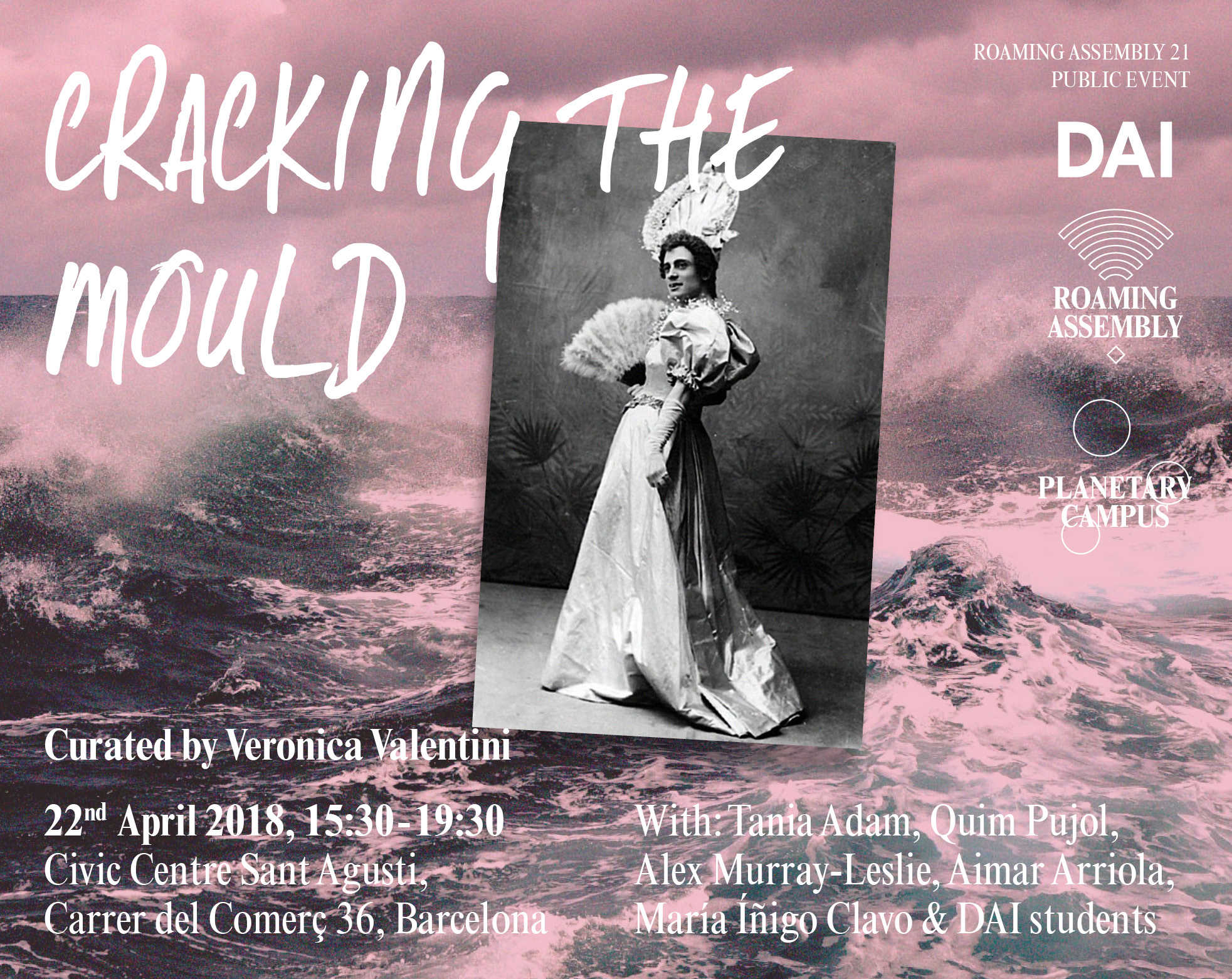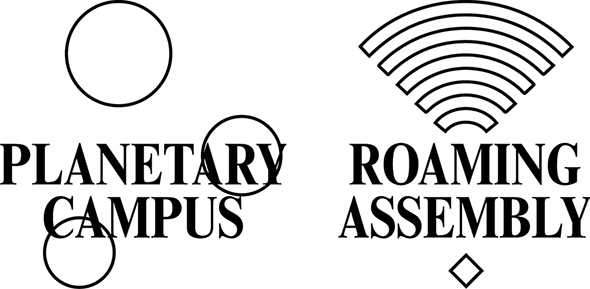2018 ~ Sunday April 22 in Barcelona: Roaming Assembly#21 ~ CRACKING THE MOULD ~ curated by Veronica Valentini
The Dutch Art Institute warmly invites you to Barcelona for the 21st edition of our Roaming Assembly. Together with invited curator Veronica Valentini and her five Barcelona-based guests we will intermesh with
CRACKING THE MOULD
a symposium conceived as a choreography that encompasses a wide range of contexts - Iberian, Brazilian and African - as well as practices - pre-artisanal, technological, fashion, music - offering a transdisciplinary perspective addressing both, tradition and change.
and curator:
scroll for practical information
PROGRAM
15.30-15.35 Welcome by DAI director Gabriëlle Schleijpen
15.35-15.50 Introduction by curator Veronica Valentini
CRACKING THE MOULD examines a constellation of experiences from the South that transcend the boundaries between disciplines, geographies and languages in an attempt to highlight the frame of modern epistemology. Considering the multiplicity of potential presents and their interfaces, this symposium is conceived as a choreography that encompasses a wide range of contexts - Iberian, Brazilian and African - and practices - pre-artisanal, technological, fashion, music - and points towards a transdisciplinary perspective addressing both, tradition and change.
Some of the questions that informed the precursory workshops with students will also cross the symposium: when we deal with art or culture are we talking about forms or a set of relations? What is at stake? How can an artist deal with an artwork, by another artist? How do embodiments of various types of presence will come into being? What unexplored skills inhabit the body? How to (re) imagine blackness through cultural leaks? How do we trust the practices we develop without falling into the limbo of recognition? What happens if we invert the use of limbs? How to rethink radio, a variety show or a tv talk? What epistemological diversity can we learn from Lina Bo Bardi‘s cross-cultural experimentation, from a Manila shawl, from négritude or from wearable instrument shoes?
15.50-16.05 Quim Pujol and DAI students: "Edmond de Bries"
“Edmond de Bries” is an approach to the artistic practice of the first professional female impersonator in Spain.
16.05-16.40 Maria Inigo Clavo: "Contents against continents. On the agency of popular art"
This assembly thinks Lina Bo Bardi interest on popular culture during the fifties and sixties and her pioneering proposal for a new museology based on recycling, the education and the alliance between crafts technics and industrial design. Her first exhibition in the main Museum in Sao Paulo designed by her in 1969, has been enacted in 2016 by the same institution triggering different debates inside and outside the conference. Her work and personality has been taken as a new object of study to rethink the Cold War period and its historization, that is one of the main a battleground of Brazilian art history. Something missing in these debates is how Bo Bardi early postcolonial perspective is bringing the opportunity to rethink western methodologies of research and display in which I would like to focus.
16.40-17.00 Quim Pujol: "Fregoli"
An attempt to rethink and update the act of the revolutionary Italian quick-change artist.
17.00-17.15 Aimar Arriola: "Interstices”
On 27 March 2018 a group of scientists reported the discovery of a new organ in the human body: the interstice, or interstitium. Celebrated by some, dismissed with skepticism by others, reports described the interstitium as a network of interconnected tissue located under the surface of the skin, in or near our lungs, digestive tracts and arteries, as well as in the fascia between the muscles. The interstitium can be found all over our bodies and yet, only thanks to the newest technology has it become visible. Invited to act as a respondent, Aimar Arriola will contribute to the seminar precisely from its interstices, its in-between spaces: between segments, between speakers, between traditions, between modesty and expectation, between surface and depth.
17.15-17.40 Break
17.40-18.05 Quim Pujol: “Manila Shawl Lecture”
The “Manila Shawl Lecture” will introduce some of the most intriguing performers of the beginning of the XXth Century: Fregoli, Raku, La Chelito, Luis Esteso, Teresita Calvó and Edmond de Bries. The historian Álvaro de Retana ironically coined the term “frivolous art” for describing variety shows, while questioning art forms claiming to be elevated and edifying. In these presentation about frivolous acts we will analyze political implications of variety shows which have been overlooked.
18.05 -18.35 Alex Murray-Leslie: “Ready to Foot: Decolonising the feet through Demaking High Heeled shoes for audiovisual theatrical performance and a new location of knowledge”
The feet play the role of support structures or even infrastructure for the rest of the body, especially for the hands. The hands, the head and the eyes are the glorified organs of vision, manipulation, tactility and calculation and the feet are a kind of infrastructural support that philosophers never bothered to speak about that much. The feet are colonised by the body, so in that sense this research aims to decolonise that hierarchy that has formatted the body as this and elevated the hand at the expense of the feet. We can use our feet for more than just walking around and some people actually develop extraordinary dexterity with their feet, not only using them to do everyday tasks, but even activities like painting or playing an instrument. Through training, it is possible for the feet to carry out complex creative tasks, beyond their normal everyday job as 'stepping machines’ (Ingold 2003). The theme of 'knowledge at foot’ and objects being ‘ready to foot’ is discussed in the form of a performance lecture. 'Knowledge at foot’ relates to situations where the feet are the location of the generation of new knowledge, contrary to ideas expressed by Martin Heidegger who proposed that objects may be experienced in two different ways as ‘ready to hand’ and ‘present at hand’ (Heidegger 1962). Via practice based research and the creation of artefacts (termed Anthropotechnological foot-prototypes and computer enhanced footwear) this unfree state of the feet is challenged through finding unexpected ways to use the feet in newly designed computer enhanced footwear. These foot devices use new technologies coupled with sensors and FM sound synthesis, and therefore afford new types of bodily extensions for creative expression. The praxis explores the development of foot based skills in the area of audio-visual theatrical performance and the related creation of audio-visual instruments created to costume and decolonise the feet.
18.35 -18.50 Aimar Arriola: "Interstices”
Continuation.
18.50 -19.20 Tania Adam: “The resurgence of subordinate knowledges”
Achille Mbembe believes that we are witnessing the Twilight of the West, the end of Europe as the central reference of our time. Foucault called it the "return of subordinate knowledges". Both point to the resurgence of new thinking possibilities that question Eurocentric narratives and representations, as well as new ways of being and being in the world that translate into a process of displacement, recognition and transformation of discourses that challenges hegemonic epistemology and promotes "epistemological decolonization". This implies, among other things, reclaiming orality, different worldviews, art and culture - in general -, and the theories of thinkers in Latin America, Africa and Asia, as well as the so-called "embodied theories" which, according to Gloria Anzaldúa, speak not from the academy but from experience and the body.
19.20 -19.30 Tania Adam and DAI students
Followed by drinks and communal dinner (upon reservation).
PRACTICAL INFORMATION
When: 22nd April 2018
Location: Civic Centre Sant Agusti, Carrer del Comerç, 36, 08003 Barcelona
Time-frame: 15.30-19.30
Admission is free ~ please join the event on facebook ~
All lectures and talks will be in English.
If you wish to join our communal dinner, please be sure to make a reservation before Friday April 13 by contacting Nikos Doulos. Our communal dinner will take place at Casal de Barri Pou de la Figuera, Carrer de Sant Pere Més Baix, 70, 08003 Barcelona.
Planetary Campus is an innovative conceptual space (without walls) where the MA curriculum "DAI Art Praxis" meets with a wide variety of external parties. A welcoming space where we want to host a fleeting, "affective community", where we generously share art and research, where complexity can be embraced and intellectual intra-actions are fostered, aiming to endow our praxes, wherever they are operational. As an infrastructure Planetary Campus is the container for several activities initiated by the DAI.
One of them is the Roaming Assembly, a recurring public symposium scheduled to take place once a month, functioning as it were as the DAI-week's 'centerfold' event. This state-of-the-art speculative and hybrid program explores specific themes and topics of contemporary relevance to the thinking of art in the world today.
Although closely interlinked with the DAI's curriculum, Roaming Assembly editions are not conceived as plain extensions of the regular DAI classes and seminars, but rather envisioned as sovereign happenings, designed to mobilize our bodies, our intelligences.
Initiator and curator-in-chief Planetary Campus: Gabriëlle Schleijpen
Senior coordinator Planetary Campus: Nikos Doulos
Documentation: Silvia Ulloa; see our Video Archive
Communication design: Lauren Alexander/Foundland
If you want to receive our DAI-BULLETIN on a monthly base you are welcome to register here.
Planetary Campus is generously supported by the Innovations Fund of the



